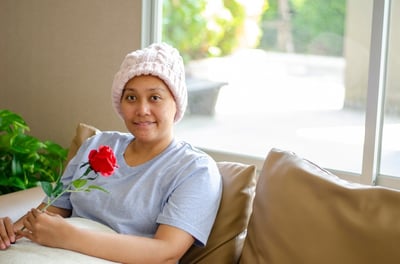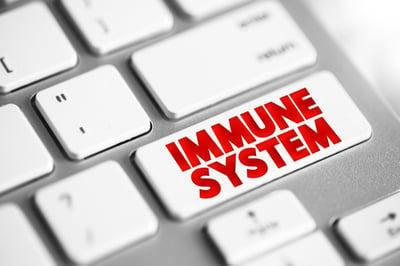FORCE's eXamining the Relevance of Articles for You (XRAY) program looks behind the headlines of cancer news to help you understand what the research means for you.
XRAY is a reliable source of hereditary cancer research-related news and information.
Learn more about the XRAY program
Relevant for: People with triple negative breast cancer, In portal: Breast Cancer
Topic : Progress in the treatment of triple-negative breast cancer
Most relevant for: People with triple-negative breast cancer
During the December 2023 San Antonio Breast Cancer Symposium, Dr. Melinda Telli presented a summary of research that has led to better treatments for triple-negative breast cancer (TNBC). These treatments now include drugs called targeted therapies and immunotherapies for both early and late stages of TNBC. (Posted 3/19/24)
Read More
Update : A breast cancer vaccine for people with an inherited BRCA1, BRCA2 or PALB2 mutation
Most relevant for: People at increased risk for breast cancer undergoing prophylactic bilateral mastectomy due to an inherited mutation in BRCA1, BRCA2 or PALB2. People with TNBC who still have breast cancer after chemotherapy.
A breast cancer vaccine is showing promise in early clinical trials. Initially, the vaccine was tested in people with triple-negative breast cancer (TNBC) who were at high risk for recurrence. Now the vaccine is being tested to lower breast cancer risk among people with an inherited mutation in BRCA1, BRCA2 or PALB2. It is also being tested in people with triple-negative breast cancer who are at high risk for recurrence and are taking the immunotherapy drug Keytruda (pembrolizumab) after completing chemotherapy. (Posted 1/31/24)
Este artículo está disponible en español.
Read More
Update : Breast cancer vaccine trial begins enrolling people with BRCA1 and PALB2 mutations
Most relevant for: People with a BRCA1 or PALB2 mutation undergoing prophylactic bilateral mastectomy
A new vaccine was first tested on people diagnosed with triple-negative breast cancer. The vaccine is now being tested to prevent breast cancer among people with an inherited mutation in BRCA1 or PALB2 who are at high risk and who are planning to have a risk-reducing mastectomy. (Posted 1/9/23) Este artículo está disponible en español.
Read More
Relevance: High


Strength of Science: High


Research Timeline: Post Approval


Study : A win for some patients with HER2-negative metastatic breast cancer
Relevance: High


Strength of Science: High


Research Timeline: Post Approval


Most relevant for: People with HER2-low metastatic breast cancer
A drug used to treat HER2-positive breast cancer improved survival in people with metastatic breast cancers that were previously considered HER2-negative. These results change practice guidelines for metastatic breast cancer and reclassify HER2 tumor marker status as “HER2-low” to guide treatment. (Posted 7/18/22)
Update: On 08/05/2022 the FDA approved Enhertu to treat people with metastatic, HER2-low breast cancer who have received prior chemotherapy in the metastatic setting or who developed disease recurrence during or within six months of completing chemotherapy. Enhertu is also approved for treatment of people with metastatic HER2-positive breast cancer who progressed after prior anti-HER2 treatment. Este artículo está disponible en español.
Read More
Relevance: Medium-High


Strength of Science: High


Research Timeline: Post Approval


Update : Pembrolizumab receives FDA approval for people with early-stage, triple-negative breast cancer
Relevance: Medium-High


Strength of Science: High


Research Timeline: Post Approval


Most relevant for: People with early-stage, triple-negative breast cancer who have a high risk for recurrence
The FDA approved the immunotherapy drug pembrolizumab (Keytruda) for the treatment of early-stage triple-negative breast cancer that has a high risk for recurrence. This marks the first approval for this type of drug, known as an immune checkpoint inhibitor, for the treatment of early-stage breast cancer. (posted 9/2/21)
Este artículo está disponible en español.
Read More
Update : Breast cancer disparities in Black Americans
Most relevant for: Black women in the US
The American Association for Cancer Research (AACR) released a 2020 report about cancer disparities among racial and ethnic groups in the United States. In this review, we highlight findings on the burden of breast cancer in Black women. (posted 8/5/21)
Este artículo está disponible en español.
Read More
Relevance: High


Strength of Science: Medium-High


Research Timeline: Post Approval


Study : Women can have safe pregnancies after breast cancer treatment
Relevance: High


Strength of Science: Medium-High


Research Timeline: Post Approval


Most relevant for: Women who have had breast cancer who are considering pregnancy.
In a large analysis of all published studies to date, most women who become pregnant after breast cancer treatment had safe pregnancies, with no increase in their cancer recurrence risk. Infants of mothers treated for breast cancer were more likely to have low birth weight, preterm birth and small size at birth but there was no increase in birth defects. Breast cancer survivors who became pregnant had a similar risk of recurrence and survival as survivors who did not become pregnant. (posted 6/24/21)
Este artículo está disponible en español.
Read More
Update : FDA allows testing of a vaccine designed to prevent breast cancer
Most relevant for: Patients with non-metastatic triple-negative breast cancer at high risk of recurrence.
Scientists have been working for many years to develop a vaccine that will prevent breast cancer. The FDA recently announced that the first clinical trial to test a preventive breast cancer vaccine can begin. This vaccine is the result of over a decade of research in animals and human cells. While researchers will first test the vaccine in women who have breast cancer, they hope to use this vaccine in the future to prevent breast cancer. (posted 5/25/21)
THIS INFORMATION HAS BEEN UPDATED on 10/12/2021: The clinical trial discussed in this XRAY review has begun recruiting participants. Researchers hope to enroll 24 patients with non-metastatic triple-negative breast cancer. The trial is being conducted at the Cleveland Clinic in Cleveland, Ohio. More information on this trial can be found here.
Este artículo está disponible en español.
Read More
Relevance: High


Strength of Science: High


Research Timeline: Post Approval


Study : Trodelvy clinical trial results likely practice-changing for people with metastatic triple-negative breast cancer
Relevance: High


Strength of Science: High


Research Timeline: Post Approval


Most relevant for: People with metastatic triple-negative breast cancer
The ASCENT study confirmed an earlier study and showed that the drug sacituzumab govitecan-hizy (Trodelvy) improves outcomes for people with previously treated metastatic triple-negative breast cancer. These results further support the use of Trodelvy as a standard therapy for patients with pretreated metastatic triple-negative breast cancer. (11/20/20)
Read More
Study : Among women with breast cancer, who should have genetic testing for an inherited mutation?
Most relevant for: Women diagnosed with breast cancer who do not know if they have an inherited mutation in a gene linked to breast cancer
Which breast cancer patients should consider genetic testing? Knowing whether you have an inherited mutation may inform the decisions you and your healthcare provider make about treatment. But it can also increase stress and anxiety. This XRAY reviews a study of how different guidelines affect genetic testing recommendations for people with breast cancer. (8/27/20)
Read More